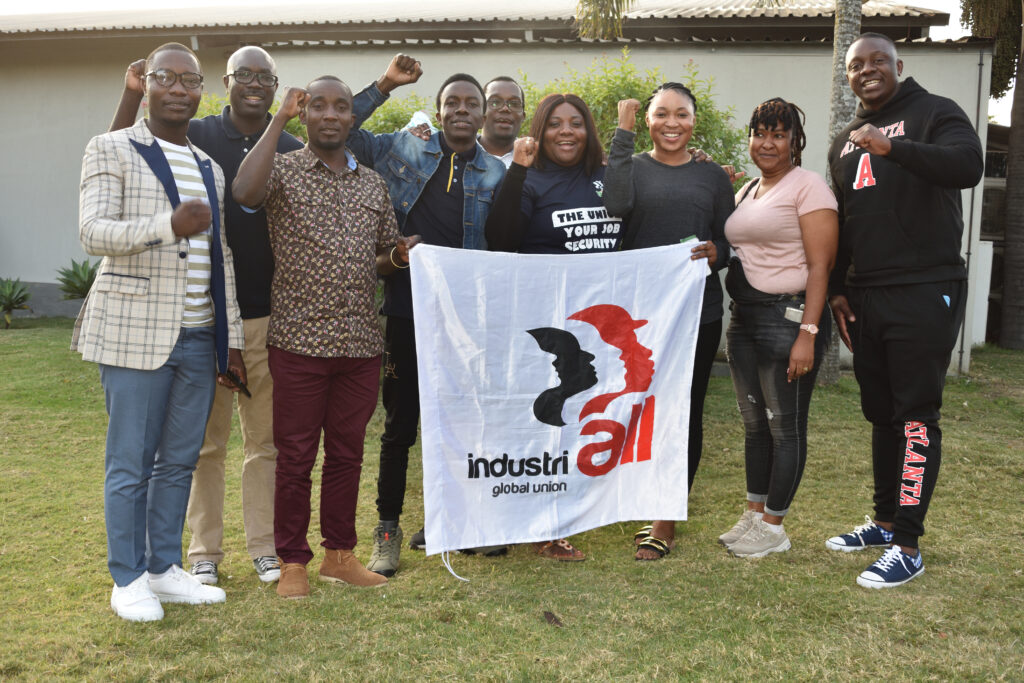2 June, 2022Mamisa’s expectation when leaving home in Dar Es Salaam, Tanzania, was to engage other young workers from Kenya, Ghana, Malawi, Nigeria, Zambia, and Zimbabwe on Just Transition, but was instead subjected to a heart-breaking ordeal with Zimbabwe’s anti-union immigration. Two other young workers from Uganda were also denied entry under similar circumstances.
Mamisa arrived at Robert Gabriel Mugabe International Airport in Zimbabwe from Nairobi at 3 am on 30 May, to attend a capacity development workshop on advancing due diligence in the energy transition supply chain in Sub Saharan Africa.
When asked by an immigration official what she did for a living, Mamisa replied that she was a trade unionist.
“This sent the official into a fury. He took me to an office where they were two other officials, and they said ‘we don’t want trade union activists in our country. And we decide who comes in and who doesn’t. You are going back home,’”
says Mamisa.
“They gave me a form to sign. And I refused saying that I cannot sign a form before reading it. They then threatened me and said I was wasting their time by requesting to read the form. If I refused to sign, they will lock me up at a police station, and even the meeting organizers will not know where I am. After that scary threat I signed the form. I pleaded with them to explain why I was being treated this way — as if I had committed a crime. And they kept saying they did not want trade union activists and non-governmental organizations in Zimbabwe, and that her name did not appear on the data base for the ministry of foreign affairs,”
narrated Mamisa, who was detained for four hours, before boarding the next plane to Nairobi. There was no Internet connection at the airport, and the Zimbabwean officials refused to explain why she was being deported.
The section of the law that was used to deny her entry requires a visitor to the country “to produce documentary or other evidence relative to his (her) claims to enter or leave Zimbabwe.” Mamisa says she presented the required documents to the officials. Surprisingly, a young worker she was travelling with to the workshop was allowed to enter the country whilst she was denied entry. When the colleague asked why, he was told not to talk to a “suspect” or risk being “questioned.”
It was only in Nairobi that she was able to get her passport back – after another four hours without food or water. She was also given the form. Even after reading the deportation form, Mamisa says it is not clear why she was deported, except that she was a trade unionist.
Joseph Tanyanyiwa, chairperson of IndustriALL Global Union national council for Zimbabwe says:
“We are disappointed by this treatment of unionists by the immigration officials. If the Government of Zimbabwe says it is open for business, it should also be open for trade union activities.”
“I find it deplorable that three young trade unionists were denied entry into Zimbabwe and deported to their home countries of Tanzania and Uganda after being harassed and threatened with arrest. They were denied of their rights and never given a chance to explain that they were in the country to attend a youth capacity development workshop. The invitation letters and documents that they presented to the officials were ignored. Shockingly, they were told by the officials that trade union activism is not allowed in Zimbabwe,”
says Atle Høie, IndustriALL general secretary.
The workshop which was attended by 25 participants including from IndustriALL offices in Geneva, Switzerland and the Sub-Saharan Africa regional office in Johannesburg, South Africa, FES Zimbabwe, and FES Trade union Competence Centre for Sub Saharan Africa. The discussions ranged from the roles that young workers can play in the Just Transition and their demands, the future of the energy mix and developing a Just Transition plan that included a decent work agenda.
